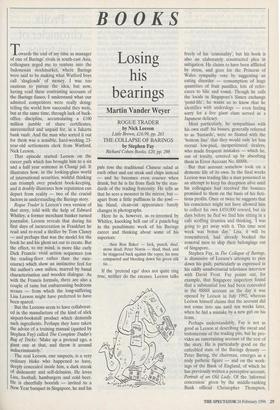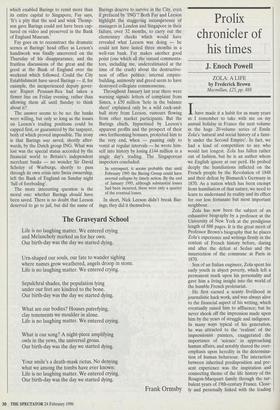BOOKS
Losing his bearings
Martin Vander Weyer
ROGUE TRADER by Nick Leeson Little Brown, £16.99, pp. 265 THE COLLAPSE OF BARINGS by Stephen Fay
Richard Cohen Books, OD, pp. 298 Towards the end of my time as manager of one of Barings' rivals in south-east Asia, colleagues urged me to venture into the Indonesian stockmarket, where Barings were said to be making what Watford boys call `shagloads' of money. I was too cautious to pursue the idea, but now, having read these contrasting accounts of the Barings fiasco, I understand what our admired competitors were really doing: telling the world how successful they were, but at the same time, through lack of back- office discipline, accumulating a £100 million jumble of share certificates, unreconciled and unpaid for, in a Jakarta bank vault. And the man who sorted it out for them was a sensible, hard-working 23- year-old settlements clerk from Watford, Nick Leeson.
That episode started Leeson on the career path which has brought him to a six and a half year sentence in Changi jail. It illustrates how, in the looking-glass world of international securities, wishful thinking can triumph over prudent book-keeping, and it doubly illustrates how reputation can depart from reality — two of the crucial factors in understanding the Barings story.
Rogue Trader is Leeson's own version of that story, told with the help of Edward Whitley, a former merchant banker turned journalist. Leeson reveals that during his first days of incarceration in Frankfurt he read and re-read a thriller by Tom Clancy — and perhaps that was the model for the book he and his ghost set out to create. But the effect, to my mind, is more like early Dick Francis: vivid action sequences (on the trading-floor rather than the race- course) which show an instinctive feel for the author's own milieu, marred by banal characterisation and wooden dialogue. As with the Francis formula, there are also a couple of tame but embarrassing bedroom scenes — from which the long-suffering Lisa Leeson might have preferred to have been spared.
But the Leesons seem to have collaborat- ed in the manufacture of the kind of slick airport-bookstall product which demands such ingredients. Perhaps they have taken the advice of a training manual (quoted by Stephen Fay) called The Complete Trader's Bag of Tricks: 'Make up a pretend ego, a giant one at that, and throw it around indiscriminately.'
The real Leeson, one suspects, is a very ordinary bloke who happened to have, deeply concealed inside him, a dark streak of dishonesty and self-delusion. He loves Lisa, football, hamburgers and cold beer. He is cheerfully boorish — invited to a New Year banquet in Singapore, he and his pals toss the traditional Chinese salad at each other and eat steak and chips instead — and he becomes even coarser when drunk, but he is far from flash by the stan- dards of the trading fraternity. He tells us that he sees a monster in the mirror, but apart from a little puffiness in the jowl his bland, clean-cut appearance barely changes in photographs.
Here he is, however, as re-invented by Whitley, knocking hell out of a punch-bag in the penultimate week of his Barings career and thinking about some of his superiors:
... then Ron Baker — kick, punch, thud, stone dead; Peter Norris — thud, thud, and he staggered back against the ropes, his nose compacted and bleeding down his green silk tie...
If the 'pretend ego' does not quite ring true, neither do the excuses. Leeson talks freely of his 'criminality', but his book is also an elaborately constructed plea in mitigation. He claims to have been afflicted by stress, and goes for the Princess of Wales sympathy vote by suggesting an eating disorder — consumption of huge quantities of fruit pastilles, lots of refer- ences to bile and vomit. Though he calls the locals in Singapore's Simex exchange `pond-life', he wants us to know that he identifies with underdogs — even feeling sorry for a live giant clam served as a Japanese delicacy.
Most particularly, he sympathises with his own staff: his bosses, generally referred to as 'bastards', were so fixated with the `bottom line' that they would only let him recruit low-paid, inexperienced dealers, who made frequent mistakes — which he, out of loyalty, covered up by absorbing them in Error Account No. 88888.
But that account somehow took on a demonic life of its own. In the final weeks Leeson was trading like a man possessed in an attempt to keep his deception alive until his colleagues had received the bonuses promised to them on the basis of his ficti- tious profits. Once or twice he suggests that his conscience might not have allowed him to collect his own £450,000 reward, but six days before he fled we find him sitting in a cafe scoffing tiramisu and thinking, 'I was going to get away with it. This time next week was bonus day.' Lisa, it will be remembered, had already booked the removal men to ship their belongings out of Singapore.
Stephen Fay, in The Collapse of Barings, is dismissive of Leeson's attempts to play down his guilt, particularly as expressed in his oddly unadversarial television interview with David Frost. Fay points out, for example, that Singapore inspectors found that a substantial loss had been concealed in the 88888 account on the day it was opened by Leeson in July 1992, whereas Leeson himself claims that the account did not come into use until ten weeks later, when he hid a mistake by a new girl on his team.
Perhaps understandably, Fay is not as good as Leeson at describing the sweat and testosterone of the trading pits, but he pro- vides an entertaining account of the rest of the story. He is particularly good on the enfeebled state of the Barings dynasty Peter Baring, the chairman, emerges as a truly pathetic figure — and on the work- ings of the Bank of England, of which he has previously written a perceptive account, Portrait of an Old Lady. Of the 'informal concession' given by the middle-ranking Bank official Christopher Thompson, which enabled Barings to remit more than its entire capital to Singapore, Fay says, `It's a pity that the nod and wink Thomp- son gave Barings could not have been cap- tured on video and preserved in the Bank of England Museum.'
Fay goes on to reconstruct the dramatic scenes at Barings' head office as Leeson's handiwork was finally uncovered on the Thursday of his disappearance, and the fruitless discussions of the great and the good at the Bank of England over the weekend which followed. Could the City Establishment have saved Barings — if, for example, the inexperienced deputy gover- nor Rupert Pennant-Rea had taken a firmer line on Friday evening, rather than allowing them all until Sunday to think about it?
The answer seems to be no: the banks were willing, but only so long as the losses on Leeson's trading positions could be capped first, or guaranteed by the taxpayer, both of which proved impossible. The irony is that Barings was saved, shortly after- wards, by the Dutch group ING. What was lost was the special status accorded by the financial world to Britain's independent merchant banks — no wonder Sir David Scholey of Warburgs, shortly to pass through its own crisis into Swiss ownership, left the Bank of England on Sunday night `full of foreboding'.
The more interesting question is the moral one: whether Barings should have been saved. There is no doubt that Leeson deserved to go to jail, but did the name of Barings deserve to survive in the City, even if prefaced by 'ING'? Both Fay and Leeson highlight the staggering incompetence of managers in London and Singapore in their failure, over 32 months, to carry out the elementary checks which would have revealed what Leeson was doing — he could not have lasted three months in a well-run bank. Fay makes another good point (one which all the instant commenta- tors, including me, underestimated at the time of the crash) about the destructive- ness of office politics: internal empire- building, animosity and greed seem to have destroyed collegiate commonsense.
Throughout January last year there were warning signals: letters of complaint from Simex, a £50 million 'hole in the balance sheet' explained only be a wild cock-and- bull story from Leeson, rumours flowing from other market participants. But the Barings chiefs, hypnotised by Leeson's apparent profits and the prospect of their own forthcoming bonuses, protected him to the very end, when — pausing only to vomit at regular intervals — he wrote him- self into history by losing £144 million in a single day's trading. The Singaporean inspectors concluded:
In retrospect, it seems probable that until February 1995 the Baring Group could have averted collapse by timely action. By the end of January 1995, although substantial losses had been incurred, these were only a quarter of the eventual losses.
In short, Nick Leeson didn't break Bar- ings; they did it themselves.



























































 Previous page
Previous page